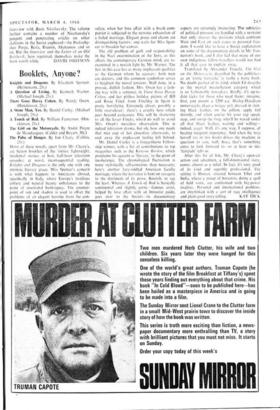Booklets, Anyone?
Knights and Dragons. By Elizabeth Spencer. (Heinemann, 21s.) .4 Question of Living. By Kenneth \Varner. (Michael Joseph, 21s.) There Goes Davey Cohen. By Wendy Owen. (Hutchinson, 21s.) A Touch of Red. By William Fennerton. (Hut- chinson, 21s.) The Girl on the Motorcycle. By Andre Pieyre
21s.)
MOST of these novels, apart from Mr. Cleary's, are fiction booklets of the 'sixties; lightweight, incidental stories; at best, half-hour television episodes; at worst, inconsequential reading. Knights and Dragons is the only one with any intrinsic literary grace. Miss Spencer's concern is with what happens to Americans abroad, specifically in Italy, where Europe's insidious culture and natural beauty unbalances to the point of emotional bankruptcy. The counter- point of sun and shadow is used to offset the problems of an elegant heroine from the con-
sulate, when her love affair with a brash com- patriot is Subjected to the nervous exhaustion of a failed marriage. Elegant prose and charm are distinguishing factors: one waits for Miss Spen- cer to broaden her canvas.
The old problem of guilt and responsibility in the Nazi extermination of the Jews, as this affects the contemporary German mind, are re- examined in a newish light by Mr. Warner. The Jew in this case has as many unpleasant qualities as the German whom he accuses: both men are doctors, and this common symbolism serves to heighten the moral tensions. Well done, in a prosaic, dullish fashion. Mrs. Owen has a lash- ing way with a sentence, in There Goes Davey Cohen, and her pitiless holiday picture of Bill and Rosie Finck from Finchley in Spain is pretty horrifying. Extremely clever, possibly a little over-clever: there's a cruelty here which goes beyond caricature. This will be shattering to all the lesser Fincks, who'd do well to avoid Mrs. Owens merciless observation. This is indeed television drama, but oh, how one needs that nice cup of hot chocolate afterwards, to soak away the unpleasant feeling left behind.
Mr. Daniel Curley is a Guggenheim Fellow- ship winner, with a list of contributions to top magazines such as the Kenyon Review, which proclaims his acccent as 'literary,' to the point of incoherence. The chronological fluctuation is more stylistically self-conscious than necessary; here's another fury-riddled American faculty marriage, where the narrative is bent on savagery to the detriment of its prose. Boorish, to say the least. Whereas A Touch of Red is basically sentimental and slightly corny—famous artist, helped by love affair with an Intourist guide, goes over to the Soviets—its documentary aspects are extremely interesting. The subtleties of political pressure are handled \N ith a restraint that only stresses the divisions which confront West and East on such issues as personal free- dom. I would like to have a Soviet explanation on some of the documentary details in Mr. Fen- nerton's book, and I also feel that many of our own indigenous fellow-travellers would not find it all that easy to explain away.
Translated by Alexander Trocchi, The Girl on the Motowycle, described by the publisher; as an 'erotic fairytale,' is really a nasty book. No doubt perfect of its kind, which I'd describe as the mental masturbation category which is so fashionable. nowadays. Briefly, it's up-to- date kicks for those who need them: imagine, first, you mount a 1200 c.c. Harley-Davidson motor-cycle, place a twiggy girl, dressed in shin- ing black leather, on the pillion, apply full throttle, and when you've hit your top speed, stop, and unzip the twig, who'll be naked under all that black leather, waiting and willing— indeed, eager. Well, it's one way, I suppose, of beating incipient impotency. And when the twig herself (as in this book) drives the machine in question to you, well, boys, that's something extra to look forward to—or at least so this 'fairytale' tells us.
After this bit of fish, Mr. Cleary's open-air action and adventure, a full-dimensional story, comes almost as a relief. In fact, it's very good of its kind and superbly professional. The setting is Bhutan, situated between Tibet and India, where a group of botanists, doing a spell of field work, are confronted with big-power rivalries. Personal and international problems are interlinked with a sort of racy intelligence and plain good story-telling. KAY DICK


































 Previous page
Previous page